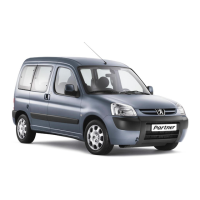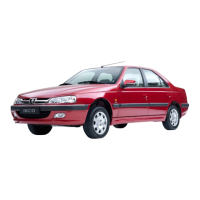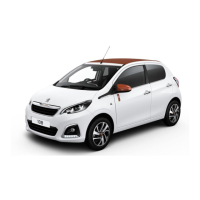Do you have a question about the PEUGEOT PARTNER 2016 and is the answer not in the manual?
Provides a general overview of the vehicle's main sections and features.
Lists and describes various optional accessories available for the vehicle.
Offers guidance on driving practices for optimizing fuel consumption and reducing emissions.
Covers essential information and procedures for preparing the vehicle for use.
Details features and controls related to the vehicle's comfort and user-friendliness.
Provides information on safety features, systems, and recommendations for safe driving.
Lists various warning lamps, their indications, and the corresponding solutions or actions to take.
Continues the explanation of warning lamps for coolant temperature, service, seat belts, and ECO mode.
Details warning lamps related to airbags, fuel level, emission control systems, and battery charge.
Explains warning lamps for power steering, door open detection, ABS, ESC, under-inflation, and particle filter.
Covers warning lamps for dipped/main beam headlamps, direction indicators, front/rear foglamps.
Details warning lamps for cruise control, speed limiter, gear shift indicator, diesel pre-heating, water in diesel filter, service spanner, and time.
Explains the different levels of AdBlue® alerts, their information, and the required solutions.
Discusses SCR system faults, related warning lamps, and solutions for BlueHDi Diesel engines.
Details the mode selection for the 6-speed electronic gearbox, including automatic, manual, reverse, and neutral.
Explains the cruise control system, its functions, and how it helps maintain a programmed speed.
Guides on selecting the cruise control function, programming a speed, temporarily exceeding it, and deactivating it.
Explains the speed limiter system, its functions, and how to program and adjust speed settings.
Guides on selecting the speed limiter function, programming a speed, and exceeding it.
Covers exceeding the programmed speed, flashing speed settings, switching the function off, and operating faults.
Explains the automatic comfort program and separate settings for driver and passenger, emphasizing good practice.
Covers vehicle labels, using qualified workshops, and precautions regarding electrical equipment and modifications.
Explains the ABS and EBFD systems for improving stability and manoeuvrability during braking.
Explains how ASR and DSC systems complement ABS for optimal drive and stability.
Introduces the Grip Control system for improving traction in various grip conditions.
Explains the different modes of Grip Control: Normal (ESC), Snow, Sand, and Off Road.
Describes the Active City Brake system, its principle, and conditions for activation.
Explains how Active City Brake operates, its limitations, and driver vigilance requirements.
Describes how the EBA system helps achieve optimum braking pressure quickly in emergencies.
Explains the design and function of airbags in maximizing occupant safety during serious collisions.
Provides general recommendations for child safety, including European regulations on child seats and the safest seating positions.
Guides on installing child seats at the front, covering rearward and forward facing positions, and airbag deactivation.
Provides a table indicating suitable locations for child seats based on child weight and seating position, according to European regulations.
Gives crucial advice on correct child seat installation, seat belt tension, and ensuring passenger seat adjustability.
Provides advice on load distribution, cooling, and driving when towing a trailer or caravan.
Details the presentation and fitting instructions for a lockable and quickly detachable swan neck towbar.
Guides on how to check the engine oil level using the dipstick and when to perform an oil change.
Provides instructions for refuelling the vehicle, including safety precautions and what to do when the low fuel level warning comes on.
Details compatible fuels, bio-fuels, and additives for petrol and diesel engines, including traveling abroad advice.
Explains the SCR technology used in BlueHDi engines to reduce NOx emissions using AdBlue®.
Explains the range indicators and rules for displaying AdBlue® alerts based on remaining driving range.
Details alerts for low AdBlue® range and the consequences of an empty tank, including starting prevention.
Discusses SCR system faults, warning lamps, and actions to take for confirmed faults or starting prevention.
Guides on removing a punctured wheel, including jack positioning and safety risks.
Provides instructions for fitting the spare wheel, tightening bolts, and securing the carrier.
Offers advice on fitting snow chains, including stopping safely, applying parking brake, and checking chain tightness.
Provides detailed van dimensions in mm for short (L1) and long (L2) versions, including overall length, height, wheelbase, and overhangs.
Lists rear door dimensions for hinged doors (small/large) and tailgate, specifying heights and widths.
Provides dimensions for the sliding side door in mm for L1 and L2 versions, including load height, width, and tailgate height.
Lists dimensions in mm for the floor cab, including overall length, height, wheelbase, and track widths.
Explains how to find vehicle weight information, recommended nose weight, and towing limits.
Introduces the 7-inch touch screen system, covering GPS, multimedia audio, and Bluetooth telephone functions.
Details the functions of steering wheel controls for radio, USB, CD, MP3, and telephone operations.
Shows the hierarchical structure of the Navigation menu, from Level 1 to Level 3.
Details navigation functions like entering destinations, route settings, saving locations, and voice synthesis.
Illustrates the process of entering destinations, addresses, and contacts within the navigation system.
Details options for navigating to current location, points of interest, town centers, and saved addresses.
Shows how to search for destinations by GPS coordinates, points on map, and points of interest (POI).
Lists categories for searching Points of Interest (POI), such as All POIs, Motor, Dining/hotels.
Guides on setting up traffic messages and map settings, including diversions and view options.
Guides on configuring risk area alerts, including audible warnings, speed limits, and filter settings.
Details settings for risk area alerts, including audible warnings, navigation filters, and confirmation.
Explains how to choose a new destination by address, contact, or route criteria.
Guides on navigating to recent destinations and contacts, including managing them.
Explains how to navigate using GPS coordinates.
Introduces DAB radio, its features like Radiotext, preset stations, and multiplex services.
Guides on using the USB port for memory sticks, including playlist creation and file management.
Illustrates the menu structure for accessing and adjusting audio settings like ambience, balance, and sound effects.
Provides detailed audio settings like ambience, balance, sound effects, ringtones, and voice volume.
Guides on modifying system settings for units, deleting data, factory settings, time/date, screen settings, and languages.
Introduces MirrorLinkTM as a connected service for smartphone integration, optional depending on device.
Explains how to connect a smartphone via USB or Bluetooth for MirrorLinkTM, including safety measures and software updates.
Illustrates the system flow for MirrorLinkTM connection and application access.
Introduces the CarPlay® system and its connection process.
Explains how to connect a smartphone for CarPlay®, including safety measures and automatic mode activation.
Shows the hierarchical structure of the Telephone menu, including Call log and Contacts.
Details operations for the call log (all calls, incoming, outgoing) and contacts management (view, create, modify, delete).
Illustrates the process of connecting to Bluetooth devices, detecting devices, and managing telephone options.
Guides on searching, connecting/disconnecting, updating, and deleting Bluetooth devices.
Provides detailed steps for pairing a Bluetooth® telephone with the vehicle's audio system.
Addresses common questions regarding navigation, such as route calculation, POI display, and audible warnings.
Discusses issues with real-time traffic information and altitude display, explaining normal phenomena.
Addresses problems with radio reception, stored stations, and traffic announcements, suggesting solutions like RDS activation.
Troubleshoots issues with USB memory stick errors, CD playback problems, and poor CD player sound.
Introduces the Peugeot Connect Sound (RD5) audio system and its basic safety precautions.
Guides on initial operations for the Peugeot Connect Sound system, including on/off, volume, source selection, and screen display modes.
Guides on receiving calls, making calls via the telephone menu or directory, and ending calls.
Provides an overview of the Screen A menu map, detailing Radio-CD, Vehicle config, and Options.
Details how to configure vehicle parameters, display settings, brightness, time/date, units, and language.
Addresses common audio system issues like system switch-off, overheating, and sound quality differences.
Explains how to navigate to contacts stored in the system.
Details how to navigate to a specific point on the map, including zooming and point information.
Guides on how to select a radio station using SOURCE, BAND AST, and LIST REFRESH buttons.
Explains how to stream audio files from a telephone via Bluetooth® and manage playback.
Details how to make and receive calls using the telephone system, including ending calls and calling new numbers/contacts.
Explains how to manage contacts, including viewing, creating, modifying, deleting, and searching by name.
Guides on Bluetooth telephone and audio configuration, including connection management and call handling.
Explains how equalizer settings affect balance and distribution, and how "All passengers" mode works.
Addresses problems with connecting Bluetooth telephones, volume issues, duplicate contacts, and SMS reception.
Explains how to use the PEUGEOT Connect SOS system for emergency calls, including its automatic activation and cancellation.
| Brand | PEUGEOT |
|---|---|
| Model | PARTNER 2016 |
| Category | Automobile |
| Language | English |











